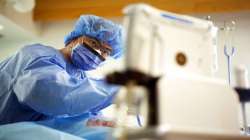Can coronavirus travel in air, if so how far? Scientists launch study
The objective of the study, which began around ten days ago, was to know whether the virus actually travels in the air and if it does, how far it goes and primarily intended to help the healthcare personnel, CCMB Director Rakesh Mishra said.

The CSIR-Centre for Cellular and Molecular Biology (CCMB) here has launched a study in hospital environment to assess how long and far the coronavirus can stay in air from an infected person, in a bid to strengthen the safety of health workers.
The objective of the study, which began around ten days ago, was to know whether the virus actually travels in the air and if it does, how far it goes and primarily intended to help the healthcare personnel, CCMB Director Rakesh Mishra said.
The study comes two months after more than 200 scientists wrote to the World Health Organisation (WHO), claiming there was evidence that the coronavirus was airborne.
Mishra said based on the outcome of the study, CCMB would later take samples from closed halls or public places like a bank or a mall to assess the probability of the spread there.
"We are going see that how long and in terms of distance and in terms of time, the virus can stay in the air from source of its spread which is the patient," he told PTI.
Under the study, samples would be collected using an air sampler in a hospital setting, from different places like an intensive care unit (ICU) or a COVID-19 ward, with varying distance from the patient such as two, four and eight metres.
It was to find out how far and how long the virus can stay - whether half-an-hour or ten minutes and till what distance it can go, he said.
"The idea is to define what is the distance which is safe and if at all is there any virus in the air for longer than a few minutes. That is the strategy to make safety of healthcare workers better," Mishra said.
The study would progress on the basis of factors, including availability of samples from hospitals, and the first conclusion was possible to be reached in around ten days, he said.
It would also help in understanding if the virus was present in the air and if so, how long, Mishra said.
The safety of the healthcare workers was the priority, he said, adding, the findings would help understand the criteria for wearing of masks and social distancing and suitable recommendations to be followed can be finalised accordingly.
Further experiments can be conducted based on the first round results. For example, if it was found that the virus travels for two or three metres, then sampling can be done in a bank and other issues like infectivity, safety of a place can be studied further, the scientist said.
CCMB, under the Council of Scientific and Industrial Research, is premier research organisation in frontier areas of modern biology.